Childcare Reflective Journal: Culture, Attachment, and Social Skills
VerifiedAdded on 2023/06/08
|7
|1761
|275
AI Summary
This reflective journal delves into the author's experiences and learnings within a childcare course, emphasizing the importance of cultural awareness, attachment theory, and effective communication between parents and teachers. The journal explores the significance of childcare in educational and social development, highlighting the influence of relationships between children, parents, and teachers on learning, behavior, and skill development. Personal experiences, such as interacting with a child from a different cultural background, are shared to illustrate the challenges and strategies involved in fostering inclusive and supportive environments. The journal also underscores the benefits of strong partnerships between families, parents, and professionals in shaping a child's personality and overall development. Desklib offers a platform to explore similar solved assignments and resources for students.
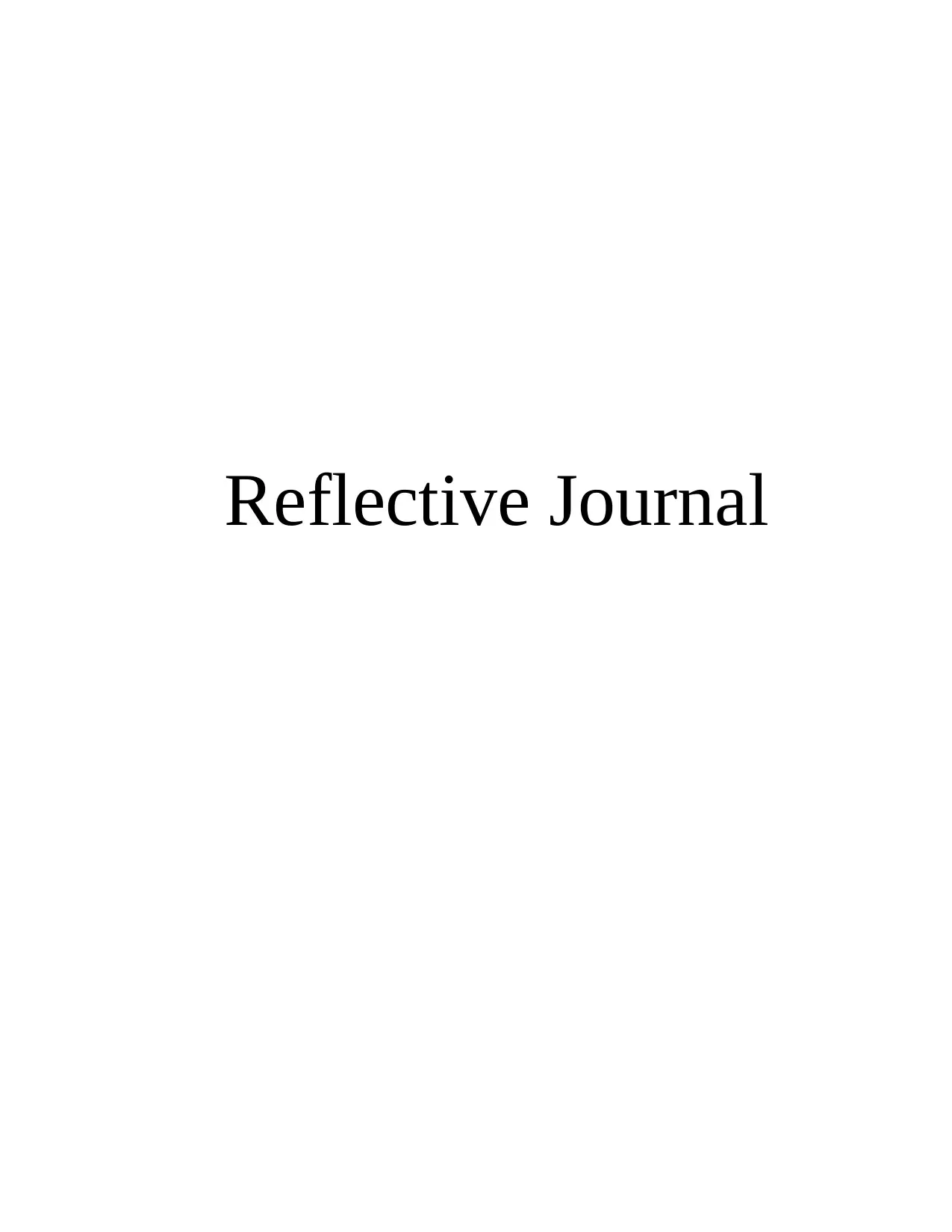
Reflective Journal
Paraphrase This Document
Need a fresh take? Get an instant paraphrase of this document with our AI Paraphraser
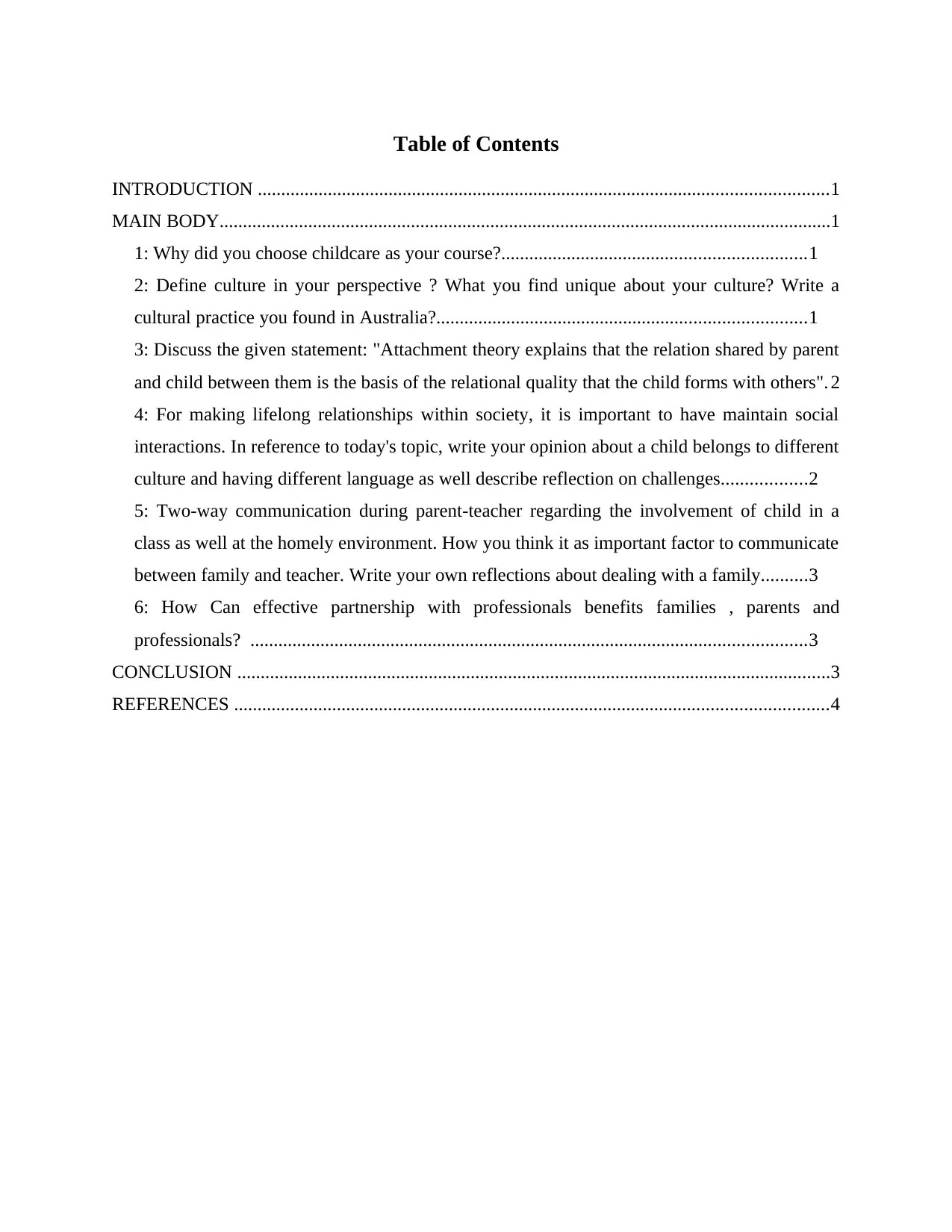
Table of Contents
INTRODUCTION ..........................................................................................................................1
MAIN BODY...................................................................................................................................1
1: Why did you choose childcare as your course?.................................................................1
2: Define culture in your perspective ? What you find unique about your culture? Write a
cultural practice you found in Australia?...............................................................................1
3: Discuss the given statement: "Attachment theory explains that the relation shared by parent
and child between them is the basis of the relational quality that the child forms with others". 2
4: For making lifelong relationships within society, it is important to have maintain social
interactions. In reference to today's topic, write your opinion about a child belongs to different
culture and having different language as well describe reflection on challenges..................2
5: Two-way communication during parent-teacher regarding the involvement of child in a
class as well at the homely environment. How you think it as important factor to communicate
between family and teacher. Write your own reflections about dealing with a family..........3
6: How Can effective partnership with professionals benefits families , parents and
professionals? .......................................................................................................................3
CONCLUSION ...............................................................................................................................3
REFERENCES ...............................................................................................................................4
INTRODUCTION ..........................................................................................................................1
MAIN BODY...................................................................................................................................1
1: Why did you choose childcare as your course?.................................................................1
2: Define culture in your perspective ? What you find unique about your culture? Write a
cultural practice you found in Australia?...............................................................................1
3: Discuss the given statement: "Attachment theory explains that the relation shared by parent
and child between them is the basis of the relational quality that the child forms with others". 2
4: For making lifelong relationships within society, it is important to have maintain social
interactions. In reference to today's topic, write your opinion about a child belongs to different
culture and having different language as well describe reflection on challenges..................2
5: Two-way communication during parent-teacher regarding the involvement of child in a
class as well at the homely environment. How you think it as important factor to communicate
between family and teacher. Write your own reflections about dealing with a family..........3
6: How Can effective partnership with professionals benefits families , parents and
professionals? .......................................................................................................................3
CONCLUSION ...............................................................................................................................3
REFERENCES ...............................................................................................................................4
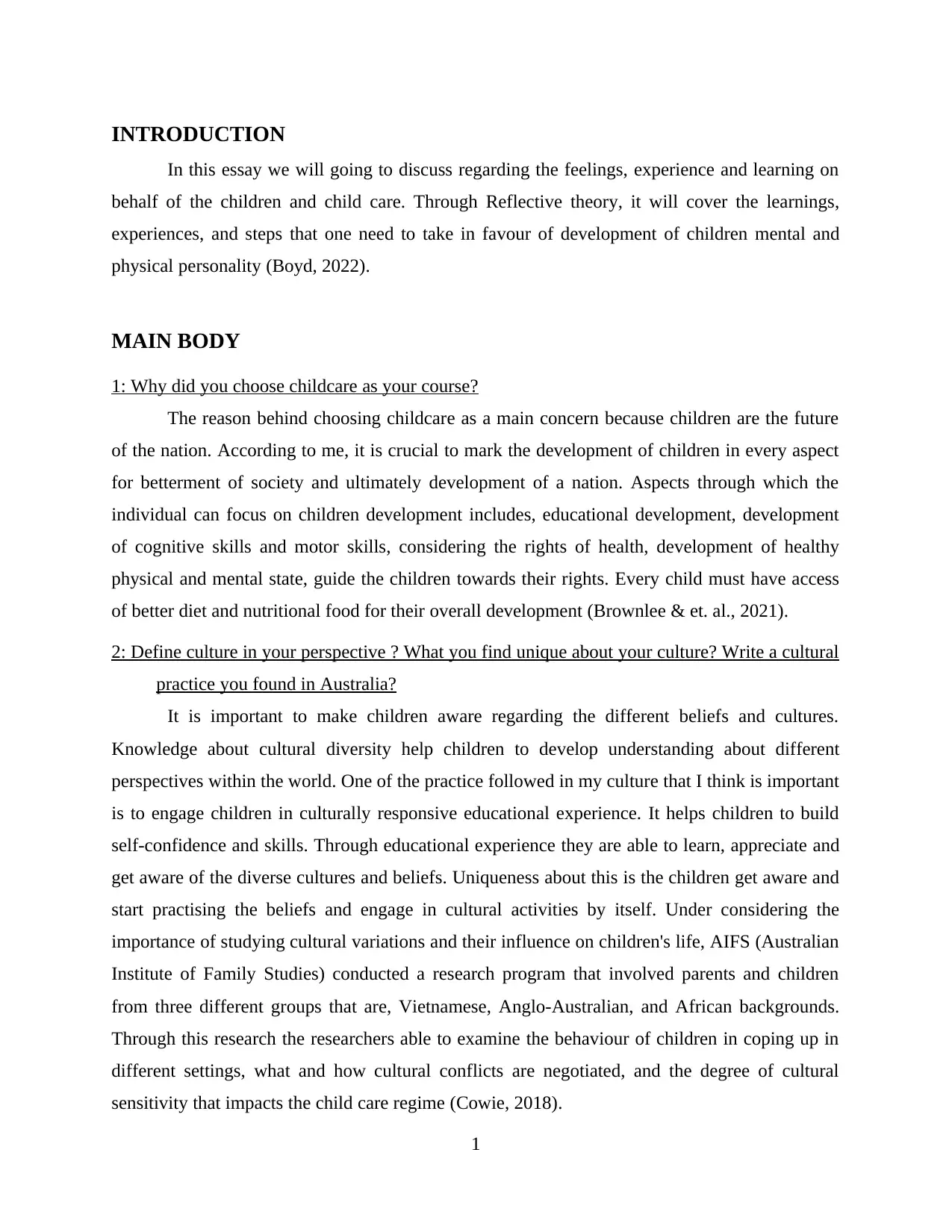
INTRODUCTION
In this essay we will going to discuss regarding the feelings, experience and learning on
behalf of the children and child care. Through Reflective theory, it will cover the learnings,
experiences, and steps that one need to take in favour of development of children mental and
physical personality (Boyd, 2022).
MAIN BODY
1: Why did you choose childcare as your course?
The reason behind choosing childcare as a main concern because children are the future
of the nation. According to me, it is crucial to mark the development of children in every aspect
for betterment of society and ultimately development of a nation. Aspects through which the
individual can focus on children development includes, educational development, development
of cognitive skills and motor skills, considering the rights of health, development of healthy
physical and mental state, guide the children towards their rights. Every child must have access
of better diet and nutritional food for their overall development (Brownlee & et. al., 2021).
2: Define culture in your perspective ? What you find unique about your culture? Write a cultural
practice you found in Australia?
It is important to make children aware regarding the different beliefs and cultures.
Knowledge about cultural diversity help children to develop understanding about different
perspectives within the world. One of the practice followed in my culture that I think is important
is to engage children in culturally responsive educational experience. It helps children to build
self-confidence and skills. Through educational experience they are able to learn, appreciate and
get aware of the diverse cultures and beliefs. Uniqueness about this is the children get aware and
start practising the beliefs and engage in cultural activities by itself. Under considering the
importance of studying cultural variations and their influence on children's life, AIFS (Australian
Institute of Family Studies) conducted a research program that involved parents and children
from three different groups that are, Vietnamese, Anglo-Australian, and African backgrounds.
Through this research the researchers able to examine the behaviour of children in coping up in
different settings, what and how cultural conflicts are negotiated, and the degree of cultural
sensitivity that impacts the child care regime (Cowie, 2018).
1
In this essay we will going to discuss regarding the feelings, experience and learning on
behalf of the children and child care. Through Reflective theory, it will cover the learnings,
experiences, and steps that one need to take in favour of development of children mental and
physical personality (Boyd, 2022).
MAIN BODY
1: Why did you choose childcare as your course?
The reason behind choosing childcare as a main concern because children are the future
of the nation. According to me, it is crucial to mark the development of children in every aspect
for betterment of society and ultimately development of a nation. Aspects through which the
individual can focus on children development includes, educational development, development
of cognitive skills and motor skills, considering the rights of health, development of healthy
physical and mental state, guide the children towards their rights. Every child must have access
of better diet and nutritional food for their overall development (Brownlee & et. al., 2021).
2: Define culture in your perspective ? What you find unique about your culture? Write a cultural
practice you found in Australia?
It is important to make children aware regarding the different beliefs and cultures.
Knowledge about cultural diversity help children to develop understanding about different
perspectives within the world. One of the practice followed in my culture that I think is important
is to engage children in culturally responsive educational experience. It helps children to build
self-confidence and skills. Through educational experience they are able to learn, appreciate and
get aware of the diverse cultures and beliefs. Uniqueness about this is the children get aware and
start practising the beliefs and engage in cultural activities by itself. Under considering the
importance of studying cultural variations and their influence on children's life, AIFS (Australian
Institute of Family Studies) conducted a research program that involved parents and children
from three different groups that are, Vietnamese, Anglo-Australian, and African backgrounds.
Through this research the researchers able to examine the behaviour of children in coping up in
different settings, what and how cultural conflicts are negotiated, and the degree of cultural
sensitivity that impacts the child care regime (Cowie, 2018).
1
⊘ This is a preview!⊘
Do you want full access?
Subscribe today to unlock all pages.

Trusted by 1+ million students worldwide
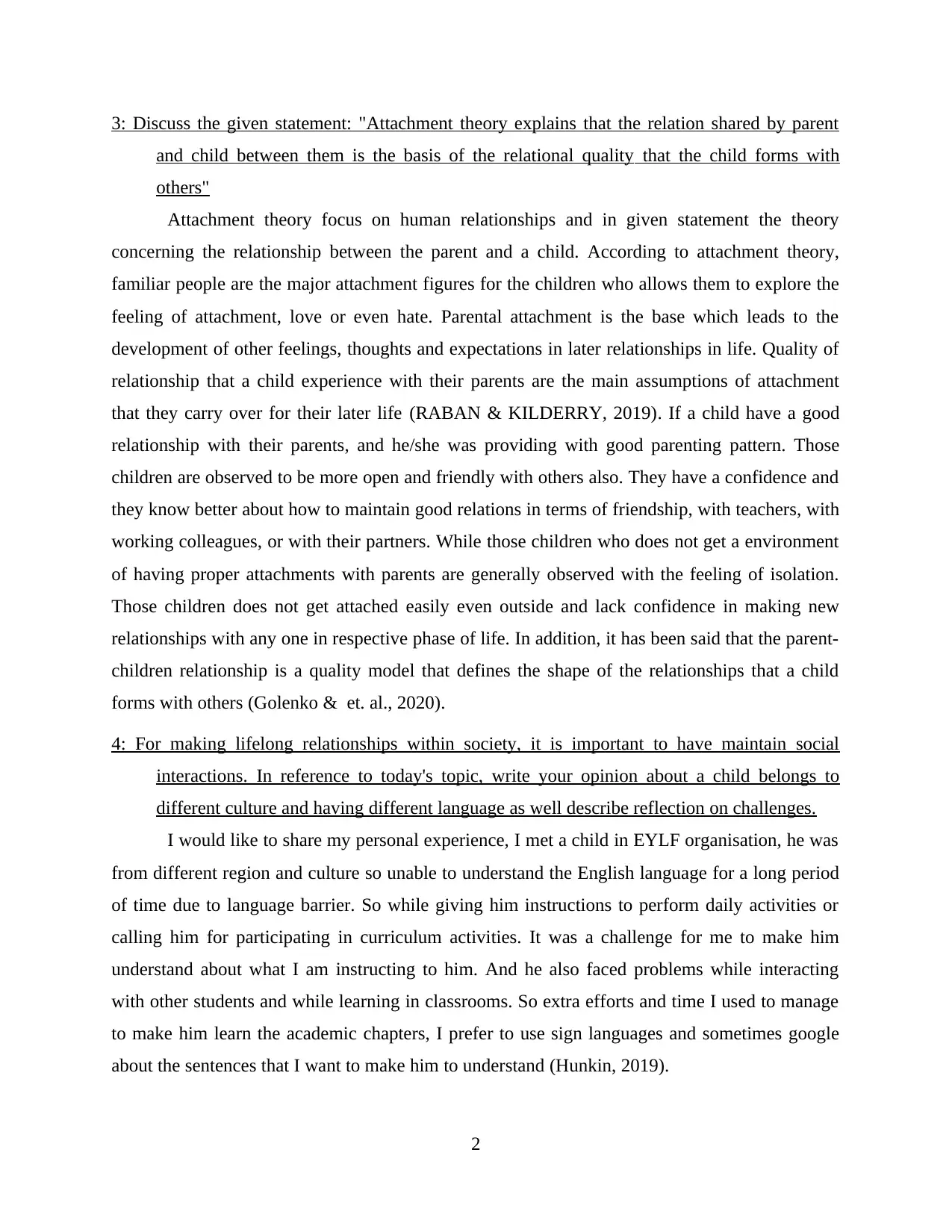
3: Discuss the given statement: "Attachment theory explains that the relation shared by parent
and child between them is the basis of the relational quality that the child forms with
others"
Attachment theory focus on human relationships and in given statement the theory
concerning the relationship between the parent and a child. According to attachment theory,
familiar people are the major attachment figures for the children who allows them to explore the
feeling of attachment, love or even hate. Parental attachment is the base which leads to the
development of other feelings, thoughts and expectations in later relationships in life. Quality of
relationship that a child experience with their parents are the main assumptions of attachment
that they carry over for their later life (RABAN & KILDERRY, 2019). If a child have a good
relationship with their parents, and he/she was providing with good parenting pattern. Those
children are observed to be more open and friendly with others also. They have a confidence and
they know better about how to maintain good relations in terms of friendship, with teachers, with
working colleagues, or with their partners. While those children who does not get a environment
of having proper attachments with parents are generally observed with the feeling of isolation.
Those children does not get attached easily even outside and lack confidence in making new
relationships with any one in respective phase of life. In addition, it has been said that the parent-
children relationship is a quality model that defines the shape of the relationships that a child
forms with others (Golenko & et. al., 2020).
4: For making lifelong relationships within society, it is important to have maintain social
interactions. In reference to today's topic, write your opinion about a child belongs to
different culture and having different language as well describe reflection on challenges.
I would like to share my personal experience, I met a child in EYLF organisation, he was
from different region and culture so unable to understand the English language for a long period
of time due to language barrier. So while giving him instructions to perform daily activities or
calling him for participating in curriculum activities. It was a challenge for me to make him
understand about what I am instructing to him. And he also faced problems while interacting
with other students and while learning in classrooms. So extra efforts and time I used to manage
to make him learn the academic chapters, I prefer to use sign languages and sometimes google
about the sentences that I want to make him to understand (Hunkin, 2019).
2
and child between them is the basis of the relational quality that the child forms with
others"
Attachment theory focus on human relationships and in given statement the theory
concerning the relationship between the parent and a child. According to attachment theory,
familiar people are the major attachment figures for the children who allows them to explore the
feeling of attachment, love or even hate. Parental attachment is the base which leads to the
development of other feelings, thoughts and expectations in later relationships in life. Quality of
relationship that a child experience with their parents are the main assumptions of attachment
that they carry over for their later life (RABAN & KILDERRY, 2019). If a child have a good
relationship with their parents, and he/she was providing with good parenting pattern. Those
children are observed to be more open and friendly with others also. They have a confidence and
they know better about how to maintain good relations in terms of friendship, with teachers, with
working colleagues, or with their partners. While those children who does not get a environment
of having proper attachments with parents are generally observed with the feeling of isolation.
Those children does not get attached easily even outside and lack confidence in making new
relationships with any one in respective phase of life. In addition, it has been said that the parent-
children relationship is a quality model that defines the shape of the relationships that a child
forms with others (Golenko & et. al., 2020).
4: For making lifelong relationships within society, it is important to have maintain social
interactions. In reference to today's topic, write your opinion about a child belongs to
different culture and having different language as well describe reflection on challenges.
I would like to share my personal experience, I met a child in EYLF organisation, he was
from different region and culture so unable to understand the English language for a long period
of time due to language barrier. So while giving him instructions to perform daily activities or
calling him for participating in curriculum activities. It was a challenge for me to make him
understand about what I am instructing to him. And he also faced problems while interacting
with other students and while learning in classrooms. So extra efforts and time I used to manage
to make him learn the academic chapters, I prefer to use sign languages and sometimes google
about the sentences that I want to make him to understand (Hunkin, 2019).
2
Paraphrase This Document
Need a fresh take? Get an instant paraphrase of this document with our AI Paraphraser
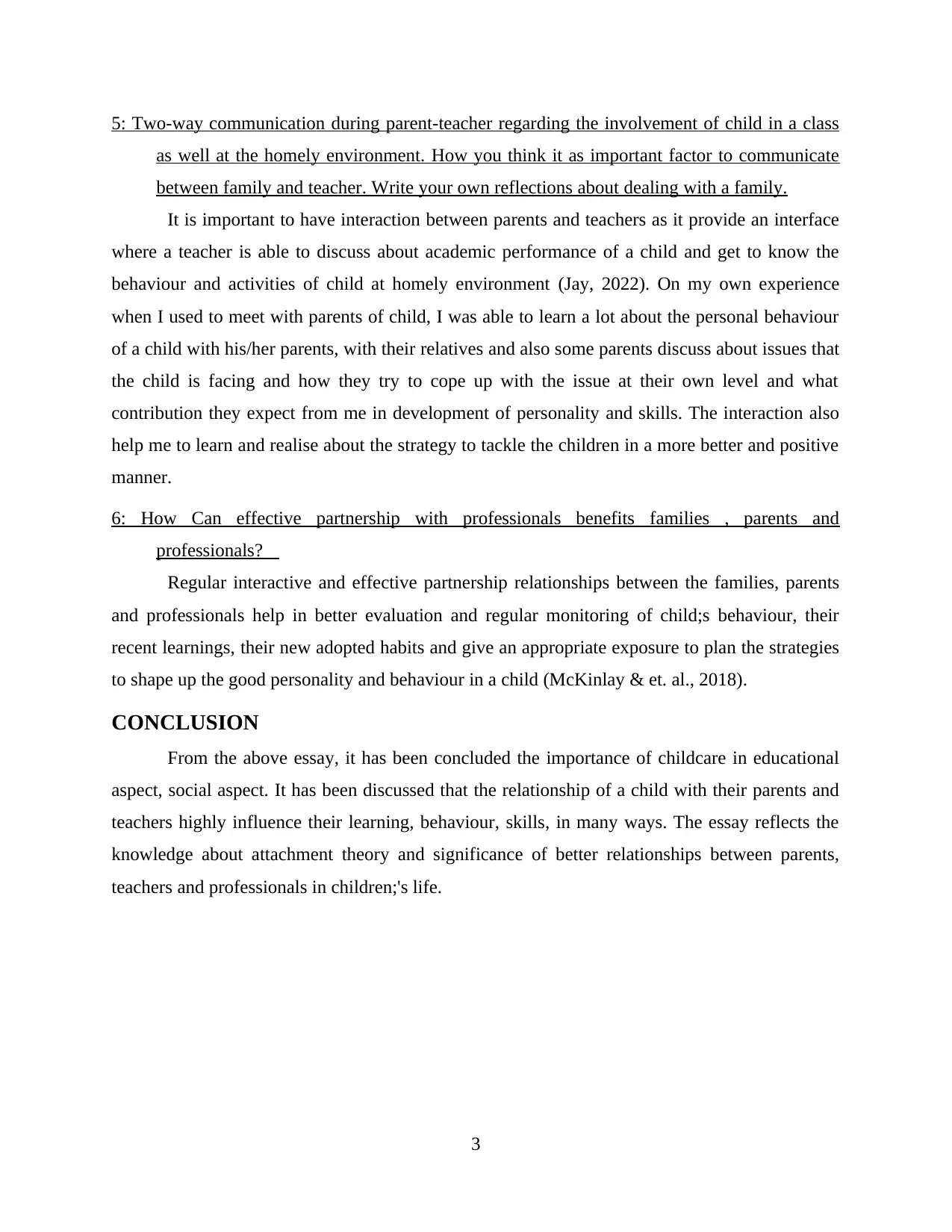
5: Two-way communication during parent-teacher regarding the involvement of child in a class
as well at the homely environment. How you think it as important factor to communicate
between family and teacher. Write your own reflections about dealing with a family.
It is important to have interaction between parents and teachers as it provide an interface
where a teacher is able to discuss about academic performance of a child and get to know the
behaviour and activities of child at homely environment (Jay, 2022). On my own experience
when I used to meet with parents of child, I was able to learn a lot about the personal behaviour
of a child with his/her parents, with their relatives and also some parents discuss about issues that
the child is facing and how they try to cope up with the issue at their own level and what
contribution they expect from me in development of personality and skills. The interaction also
help me to learn and realise about the strategy to tackle the children in a more better and positive
manner.
6: How Can effective partnership with professionals benefits families , parents and
professionals?
Regular interactive and effective partnership relationships between the families, parents
and professionals help in better evaluation and regular monitoring of child;s behaviour, their
recent learnings, their new adopted habits and give an appropriate exposure to plan the strategies
to shape up the good personality and behaviour in a child (McKinlay & et. al., 2018).
CONCLUSION
From the above essay, it has been concluded the importance of childcare in educational
aspect, social aspect. It has been discussed that the relationship of a child with their parents and
teachers highly influence their learning, behaviour, skills, in many ways. The essay reflects the
knowledge about attachment theory and significance of better relationships between parents,
teachers and professionals in children;'s life.
3
as well at the homely environment. How you think it as important factor to communicate
between family and teacher. Write your own reflections about dealing with a family.
It is important to have interaction between parents and teachers as it provide an interface
where a teacher is able to discuss about academic performance of a child and get to know the
behaviour and activities of child at homely environment (Jay, 2022). On my own experience
when I used to meet with parents of child, I was able to learn a lot about the personal behaviour
of a child with his/her parents, with their relatives and also some parents discuss about issues that
the child is facing and how they try to cope up with the issue at their own level and what
contribution they expect from me in development of personality and skills. The interaction also
help me to learn and realise about the strategy to tackle the children in a more better and positive
manner.
6: How Can effective partnership with professionals benefits families , parents and
professionals?
Regular interactive and effective partnership relationships between the families, parents
and professionals help in better evaluation and regular monitoring of child;s behaviour, their
recent learnings, their new adopted habits and give an appropriate exposure to plan the strategies
to shape up the good personality and behaviour in a child (McKinlay & et. al., 2018).
CONCLUSION
From the above essay, it has been concluded the importance of childcare in educational
aspect, social aspect. It has been discussed that the relationship of a child with their parents and
teachers highly influence their learning, behaviour, skills, in many ways. The essay reflects the
knowledge about attachment theory and significance of better relationships between parents,
teachers and professionals in children;'s life.
3
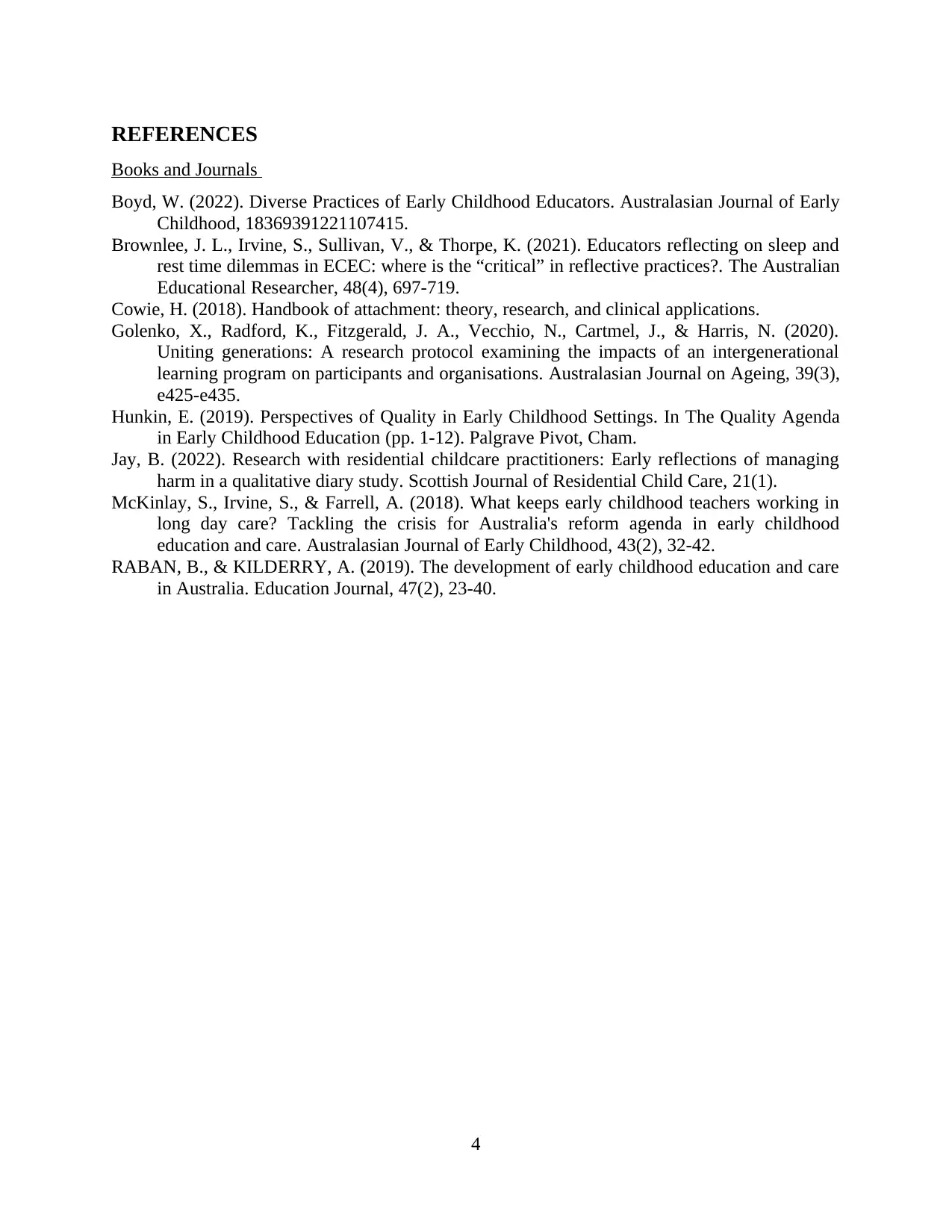
REFERENCES
Books and Journals
Boyd, W. (2022). Diverse Practices of Early Childhood Educators. Australasian Journal of Early
Childhood, 18369391221107415.
Brownlee, J. L., Irvine, S., Sullivan, V., & Thorpe, K. (2021). Educators reflecting on sleep and
rest time dilemmas in ECEC: where is the “critical” in reflective practices?. The Australian
Educational Researcher, 48(4), 697-719.
Cowie, H. (2018). Handbook of attachment: theory, research, and clinical applications.
Golenko, X., Radford, K., Fitzgerald, J. A., Vecchio, N., Cartmel, J., & Harris, N. (2020).
Uniting generations: A research protocol examining the impacts of an intergenerational
learning program on participants and organisations. Australasian Journal on Ageing, 39(3),
e425-e435.
Hunkin, E. (2019). Perspectives of Quality in Early Childhood Settings. In The Quality Agenda
in Early Childhood Education (pp. 1-12). Palgrave Pivot, Cham.
Jay, B. (2022). Research with residential childcare practitioners: Early reflections of managing
harm in a qualitative diary study. Scottish Journal of Residential Child Care, 21(1).
McKinlay, S., Irvine, S., & Farrell, A. (2018). What keeps early childhood teachers working in
long day care? Tackling the crisis for Australia's reform agenda in early childhood
education and care. Australasian Journal of Early Childhood, 43(2), 32-42.
RABAN, B., & KILDERRY, A. (2019). The development of early childhood education and care
in Australia. Education Journal, 47(2), 23-40.
4
Books and Journals
Boyd, W. (2022). Diverse Practices of Early Childhood Educators. Australasian Journal of Early
Childhood, 18369391221107415.
Brownlee, J. L., Irvine, S., Sullivan, V., & Thorpe, K. (2021). Educators reflecting on sleep and
rest time dilemmas in ECEC: where is the “critical” in reflective practices?. The Australian
Educational Researcher, 48(4), 697-719.
Cowie, H. (2018). Handbook of attachment: theory, research, and clinical applications.
Golenko, X., Radford, K., Fitzgerald, J. A., Vecchio, N., Cartmel, J., & Harris, N. (2020).
Uniting generations: A research protocol examining the impacts of an intergenerational
learning program on participants and organisations. Australasian Journal on Ageing, 39(3),
e425-e435.
Hunkin, E. (2019). Perspectives of Quality in Early Childhood Settings. In The Quality Agenda
in Early Childhood Education (pp. 1-12). Palgrave Pivot, Cham.
Jay, B. (2022). Research with residential childcare practitioners: Early reflections of managing
harm in a qualitative diary study. Scottish Journal of Residential Child Care, 21(1).
McKinlay, S., Irvine, S., & Farrell, A. (2018). What keeps early childhood teachers working in
long day care? Tackling the crisis for Australia's reform agenda in early childhood
education and care. Australasian Journal of Early Childhood, 43(2), 32-42.
RABAN, B., & KILDERRY, A. (2019). The development of early childhood education and care
in Australia. Education Journal, 47(2), 23-40.
4
⊘ This is a preview!⊘
Do you want full access?
Subscribe today to unlock all pages.

Trusted by 1+ million students worldwide

5
1 out of 7
Related Documents
Your All-in-One AI-Powered Toolkit for Academic Success.
+13062052269
info@desklib.com
Available 24*7 on WhatsApp / Email
![[object Object]](/_next/static/media/star-bottom.7253800d.svg)
Unlock your academic potential
Copyright © 2020–2026 A2Z Services. All Rights Reserved. Developed and managed by ZUCOL.





